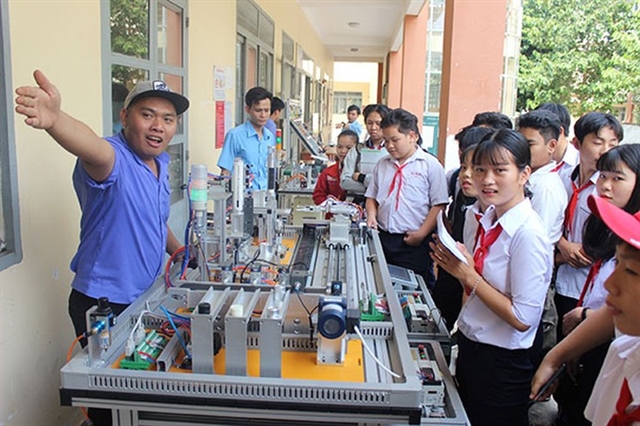 Society
Society


|
| Students of the Đồng Nai College of High Technology are at a practice period. — Photo courtesy of the college |
HÀ NỘI — The Ministry of Education and Training has said students must be educated in line with vocational skills, but schools says this isn't straight forward, as there are many obstacles standing in their way.
Lê Đình Thâm, principal of the Đồng Nai College of High Technology (DCoHT), told the Giáo dục Việt Nam (Việt Nam Education) e-magazine that a majority of students opted for studying both traditional subjects like maths, literature and history, and vocational training at the same time.
The college says they must also prepare teachers to educate in more practical skills, like mechanics and joinery, to give the students more job opportunities when they leave school.
However, he said some students did not have enough capacity to learn both high school knowledge and vocational skills.
When the students first come to the DCoHT, the college discusses options with students, but later discovers that those who pick both vocational and knowledge modules, struggle in the long-term.
In the past two years, only 87 per cent of students at the DCoHT completed the high school curriculum at the same time with vocational training, ranking the fifth among vocational schools in Đồng Nai Province.
Thâm said that it was difficult for 100 per cent of students to fulfill both at the same time because the amount of knowledge was so great.
Thanks to learning high school knowledge in parallel with professional skills, some of students of the DCoHT then passed entrance exam to universities.
Thâm said that the DCoHT always tried to meet the Ministry of Education and Training’s regulations, and was enrolling seven more teachers to teach high school knowledge at the college.
An educational consultant of a vocational school in southern area, who remained anonymous, told the Giáo dục Việt Nam (Việt Nam Education) e-magazine that vocational schools often worked with other high schools to teach knowledge for seven subjects including math, physics, chemistry, literature, history, geography and biology.
Literature, math and history are compulsory subjects, and students can choose the remaining subjects based on their wishes.
“When students enter vocational schools, their main purpose is learning as an apprentice and have job right after graduating from the school, so co-ordination between the Ministry of Labour, Invalids and Social Affairs and the Ministry of Education and Training is needed,” he said.
In previous years, vocational training schools must wait for teaching plans and term-end test schedules from other high schools, so they remained passive in the work.
Many students felt too hard while studying both knowledge and vocational skills at the same time, and the school always gave them encouragement to fulfill the task, he said. — VNS




